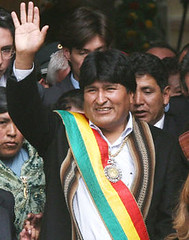
President Evo Morales Spoke at the United Nations General Assembly in New York
Originally uploaded by panafnewswire
Press conference by president of Bolivia, Evo Morales Ayma, April 22
(Media-Newswire.com) - Bolivian President Evo Morales Ayma this afternoon dismissed calls by an emerging separatist movement in the eastern lowland Bolivian state of Santa Cruz to hold a so-called autonomy referendum on 4 May as an “illegal” and “not very important” move by a select group of Santa Cruz wealthy families to divide the country.
“No real Bolivian agrees with division, but there will always be this kind of initiative started by families that want to create obstacles,” Mr. Morales said during a Headquarters press conference on Bolivia’s current situation, as well as today’s opening at Headquarters of the seventh session of the Permanent Forum on Indigenous Issues.
“Our obligation is to maintain the unity of the country and bring about transformation based on legality and constitutionality over and above any sectarian interests or claims,” he said, stressing that “the unity of the country comes first”.
President Morales, who took office in January 2006, said Bolivia was undergoing a deep transformation towards democracy and the redistribution of wealth as part of its struggle against a 500-year-old history of imperialism.
“When one seeks unity and equality and, above all, social justice, there will always be obstacles,” he said. There had been progress in the past few years, but it would take time to make profound structural and social changes, as well as preserve and capitalize on the country’s vast natural resources for the benefit of all Bolivians.
“What encourages me is the warmth and affection I experience when I go to the fields and towns and when I visit and talk to people. Their support for a social revolution is very encouraging,” he said.
During the country’s colonial era, the enemies of indigenous Bolivians were the Viceroy, the Catholic Church and the upper classes, which had a stranglehold on the nation’s political, religious and financial life, respectively, he said. While remnants of that legacy remained, and powerful interests continued their fight to maintain control, democracy was in fact deepening and the State was now working for the common good. Just five years ago, Bolivians were granted the right to a referendum on their political leaders and their future.
In 2005, under the previous administration, Bolivia earned $300 million from its hydrocarbons industry, he noted. Last year, thanks to moves to nationalize that industry, Bolivian officials took in $1.93 billion and distributed the earnings to districts, mayor’s offices, schools and other public entities throughout the country for socio-economic development. “We’re very happy to see this because this is the first time that the State has managed to have an effect on each home, each family,” he said.
He explained that the Morales Administration had also lowered the legal pension age from 65 to 60, and had used 30 per cent of the country’s hydrocarbons tax revenues to close the wide pension gap so that all Bolivians from farmers to court judges received a liveable income upon retirement.
In an effort to implement the September 2007 United Nations Declaration on the Rights of Indigenous Peoples, he said the right to indigenous autonomy had been incorporated into the Bolivian Constitution and work was under way to consolidate those rights regionally.
Fielding questions from correspondents on his views of climate change, the President also touted the indigenous tradition of communal living, respect for Mother Earth and the end of private property as solutions to global warming. “The concentration of land or money in a few hands is not the solution to our problems,” he said. “The day environmental problems become so acute, you’re not going to suffer less because you’re so rich or so powerful. Let’s use that money to protect the environment so that everyone will benefit.”
Further, he criticized the use of farmland to produce biofuels for automobiles, saying it was causing wheat and other food prices to rise fast, seriously harming indigenous and very poor people worldwide. “According to some Presidents and some transnational companies, cars are more important than people,” he said, stressing the importance of raising international awareness to end such biofuel development.
As for the right of Bolivians to chew coca leaves, Mr. Morales said the proposal to ban coca leaf consumption was contrary to the United Nations Declaration on the Rights of Indigenous People. He had voiced his complaints in a letter to the Secretary-General, calling on the Organization to respect the merits of coca leaves and their historical and cultural value among indigenous communities.
Regarding last year’s decisions by the Fédération Internationale de Football Association (FIFA) to ban soccer matches in La Paz because of its high altitude and Mr. Morales’ subsequent lobbying that ended that ban, he said it was a form of discrimination against people living in high altitudes. Soccer, like other sports, was good for one’s health and was part of integration. Bolivia was preparing a petition for the Office of the United Nations High Commissioner for Human Rights (OHCHR) to address the marginalization of and discrimination against Bolivia and to defend the universality of soccer.
Concerning charges by the Peruvian Prime Minister and others that centres of the Bolivarian Alternative for the Americas (ALBA) being set up in Bolivia and Venezuela were helping to re-establish rebel groups such as the Shining Path and Tupac Amara, Mr. Morales said that maybe those centres destabilized empires, but not people. “What we’re looking for now in Latin America are liberating democracies,” he said.
Republished from Media Newswire
Posted by Bolivia Rising on Thursday, April 24, 2008
No comments:
Post a Comment